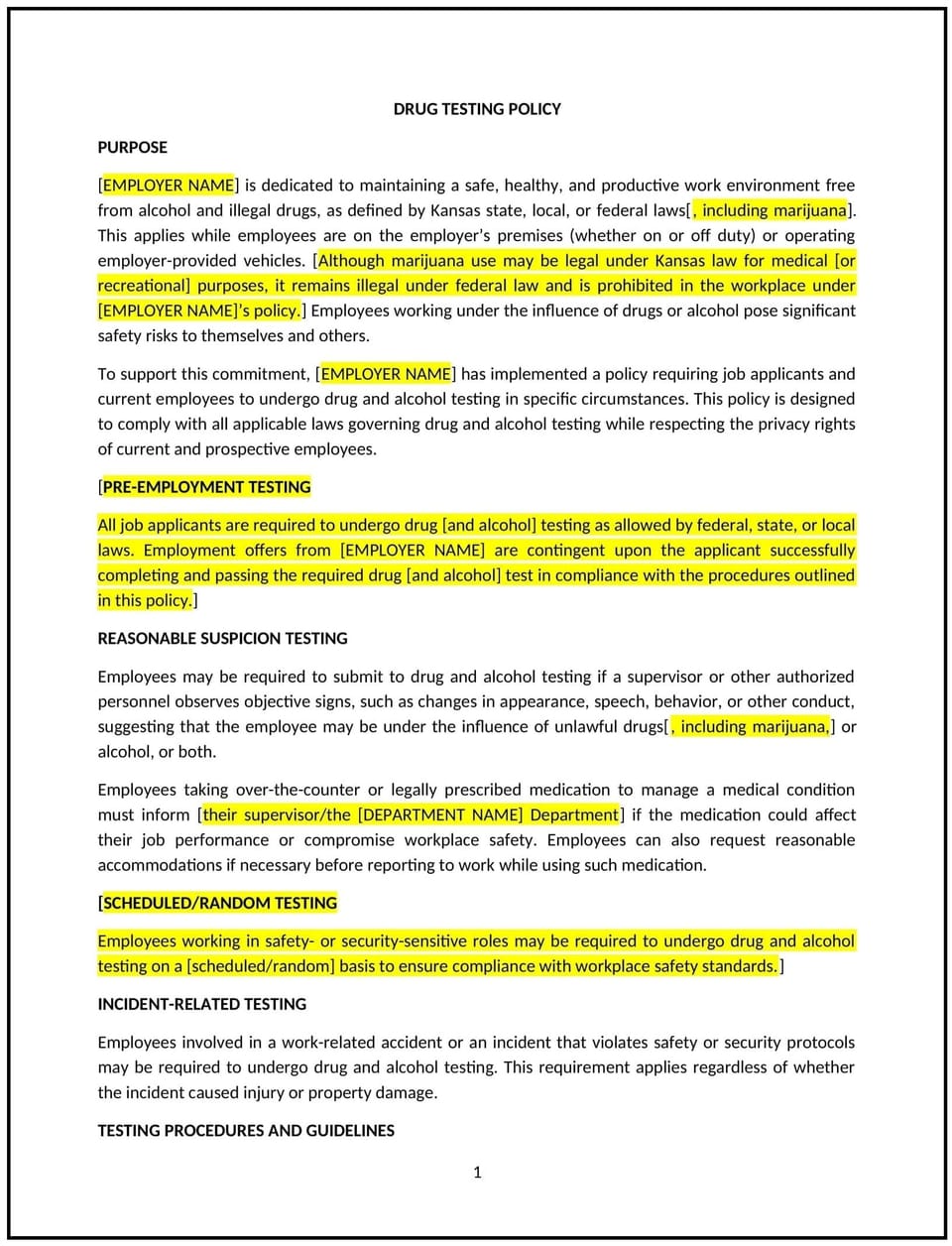Drug testing policy (Kansas): Free template

Drug testing policy (Kansas)
A drug testing policy helps Kansas businesses establish clear guidelines for drug testing in the workplace to promote safety, productivity, and compliance with legal requirements. This policy outlines the procedures for conducting drug tests, when testing is required, and how results will be handled.
By implementing this policy, businesses can minimize workplace risks related to substance abuse, foster a safe working environment, and ensure fair and consistent testing practices.
How to use this drug testing policy (Kansas)
- Define testing procedures: Businesses should specify when and how drug tests will be conducted, such as pre-employment, random, reasonable suspicion, or post-accident testing.
- Establish prohibited substances: Businesses should outline the substances that are prohibited under the policy, including illegal drugs and certain prescription medications, as well as alcohol if relevant.
- Specify testing methods: Businesses should define which testing methods will be used, such as urine, saliva, blood, or hair testing, and ensure they are conducted by certified professionals.
- Address confidentiality: Businesses should ensure that all drug test results are confidential and handled in accordance with privacy laws and regulations.
- Outline consequences of positive results: Businesses should clarify the consequences of failing a drug test, which may include disciplinary action, retraining, or termination, depending on company policy and the severity of the violation.
- Ensure employee rights: Businesses should make employees aware of their right to challenge test results, request a retest, or provide an explanation for a positive result.
- Review and update regularly: Businesses should periodically assess the policy to ensure it remains in line with legal requirements and workplace needs.
Benefits of using a drug testing policy (Kansas)
- Promotes a safe workplace: Reduces the risk of accidents or injuries related to substance abuse.
- Increases productivity: Ensures employees are fit for duty, helping to maintain high levels of productivity and performance.
- Protects company reputation: Demonstrates the business’s commitment to maintaining a drug-free workplace.
- Ensures fairness and consistency: Provides a clear and consistent process for all employees, ensuring that drug testing is handled fairly and uniformly.
- Reduces legal risks: Helps businesses mitigate the risk of legal action related to substance abuse or workplace accidents.
- Enhances employee trust: Employees are more likely to trust a company with a transparent and clearly communicated drug testing policy.
Tips for using this drug testing policy (Kansas)
- Communicate the policy clearly: Businesses should ensure that all employees are aware of the drug testing policy, including when tests will occur and what is required of them.
- Provide training for managers: Supervisors should be trained to recognize signs of impairment and know how to handle reasonable suspicion tests in accordance with the policy.
- Be consistent in enforcement: Businesses should apply the policy uniformly to all employees to avoid claims of discrimination or unfair treatment.
- Ensure privacy and confidentiality: Drug test results should be kept confidential and shared only with authorized personnel.
- Offer support for employees with substance abuse issues: Businesses should provide resources for employees who may be struggling with substance abuse, such as Employee Assistance Programs (EAPs).
- Review legal requirements regularly: Businesses should stay informed about local, state, and federal laws related to drug testing to ensure compliance.
Q: Why should Kansas businesses implement a drug testing policy?
A: Businesses should implement a drug testing policy to promote safety, increase productivity, protect their reputation, and ensure a consistent and fair process for all employees.
Q: What types of drug tests should businesses conduct?
A: Businesses should consider conducting pre-employment, random, reasonable suspicion, and post-accident tests, depending on industry requirements and workplace risks.
Q: What should businesses do if an employee refuses a drug test?
A: Businesses should outline the consequences of refusal in the policy, which may include disciplinary action or termination, depending on company policy.
Q: How can businesses handle positive drug test results?
A: Businesses should define consequences for positive test results, such as disciplinary action, retraining, or termination, depending on the severity of the violation and whether the employee is a repeat offender.
Q: Should businesses offer rehabilitation or support for employees with substance abuse issues?
A: Businesses should consider offering support through Employee Assistance Programs (EAPs) or referrals to rehabilitation services for employees who test positive and need help addressing substance abuse.
Q: How often should businesses review and update their drug testing policy?
A: Businesses should review their drug testing policy annually or whenever legal requirements or workplace needs change to ensure the policy remains relevant and effective.
This article contains general legal information and does not contain legal advice. Cobrief is not a law firm or a substitute for an attorney or law firm. The law is complex and changes often. For legal advice, please ask a lawyer.


